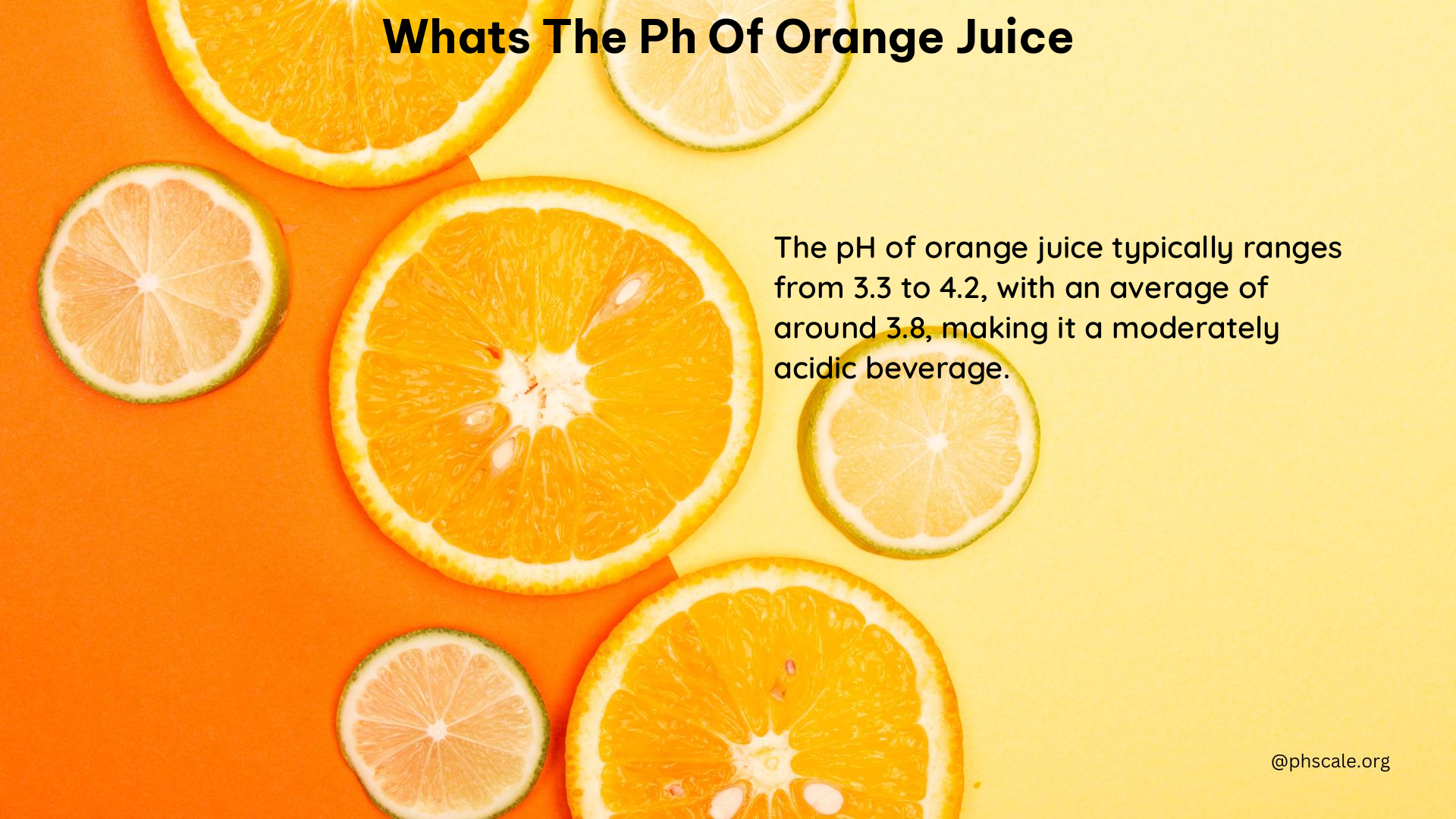The pH of orange juice ranges from 3.3 to 4.2, making it slightly acidic. This acidity is due to the high levels of citric acid present in oranges, which gives them their tangy flavor.
Understanding the Acidity of Orange Juice
Orange juice is a popular beverage that is widely consumed around the world. It is known for its refreshing taste and numerous health benefits, including its high vitamin C content. However, one of the key characteristics of orange juice is its acidity, which is determined by its pH level.
The pH scale ranges from 0 to 14, with 7 being neutral. Anything below 7 is considered acidic, while anything above 7 is considered basic or alkaline. The pH of orange juice typically falls between 3.3 and 4.2, making it slightly acidic.
This acidity is primarily due to the presence of citric acid, which is the predominant acid found in oranges. Citric acid is a weak acid that dissociates in water, releasing hydrogen ions (H+) and giving orange juice its characteristic tart and tangy flavor.
Factors Affecting the pH of Orange Juice

The pH of orange juice can vary depending on several factors, including:
-
Variety of Oranges: Different varieties of oranges can have different levels of citric acid, which can affect the overall pH of the juice. For example, Valencia oranges tend to have a higher pH (around 4.0) compared to Navel oranges (around 3.5).
-
Ripeness of Oranges: The ripeness of the oranges used to make the juice can also influence the pH. Unripe oranges tend to have a higher acidity, while ripe oranges have a slightly lower acidity.
-
Processing Methods: The way the orange juice is processed can also impact its pH. For instance, pasteurization or the addition of preservatives can slightly alter the pH of the final product.
-
Dilution: If the orange juice is diluted with water or other liquids, the pH may change accordingly.
Measuring the pH of Orange Juice
To determine the pH of orange juice, a pH meter or pH test strips can be used. These tools measure the concentration of hydrogen ions (H+) in the liquid, which directly corresponds to the pH value.
Here’s a step-by-step guide on how to measure the pH of orange juice:
- Gather the necessary equipment: a pH meter or pH test strips, a clean container, and a sample of orange juice.
- Calibrate the pH meter according to the manufacturer’s instructions, using standard buffer solutions.
- If using pH test strips, dip the strip into the orange juice sample and compare the color change to the provided pH scale.
- If using a pH meter, immerse the electrode into the orange juice sample and wait for the reading to stabilize.
- Record the pH value, which should fall within the range of 3.3 to 4.2 for most orange juice samples.
It’s important to note that the pH of orange juice can vary slightly depending on the specific brand, variety, and processing methods used.
Health Implications of the pH of Orange Juice
The acidity of orange juice, as determined by its pH, can have some health implications:
-
Dental Health: The low pH of orange juice can potentially erode tooth enamel, leading to increased sensitivity and a higher risk of cavities. It’s recommended to consume orange juice in moderation and to practice good oral hygiene.
-
Digestive System: The acidity of orange juice can stimulate the production of stomach acid, which can be beneficial for digestion. However, for individuals with certain digestive conditions, such as gastroesophageal reflux disease (GERD), the acidity of orange juice may exacerbate symptoms.
-
Nutrient Absorption: The acidity of orange juice can enhance the absorption of certain nutrients, such as iron, by making them more bioavailable in the body.
-
Skin Health: The citric acid in orange juice can have a mild exfoliating effect on the skin, which may be beneficial for some individuals. However, the acidity can also be irritating for those with sensitive skin.
It’s important to note that the overall health benefits of orange juice outweigh the potential drawbacks associated with its acidity, as long as it is consumed in moderation as part of a balanced diet.
Conclusion
In conclusion, the pH of orange juice typically ranges from 3.3 to 4.2, making it slightly acidic. This acidity is primarily due to the high levels of citric acid present in oranges, which gives the juice its distinctive tart and tangy flavor.
The pH of orange juice can be influenced by various factors, such as the variety of oranges used, the ripeness of the fruit, and the processing methods employed. Understanding the pH of orange juice is important as it can have implications for dental health, digestion, nutrient absorption, and skin health.
By being aware of the acidity of orange juice and consuming it in moderation, individuals can enjoy the numerous health benefits of this popular beverage while minimizing any potential drawbacks associated with its pH.
